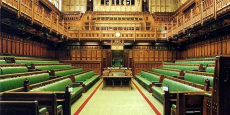
If you’ve been watching the news, you’ve probably heard about the general election that’s happening this May. This decides what our government is going to be for the next few years, as well as who your local MP will be. It’s very important to turn out to vote, so if you can encourage people you know (they have to be 18 or older!) to go, you’ll really be helping the problem we have. In the UK, the number of people who actually go out to vote is really low, which shows that our democratic system is failing. Many people feel that if they go out to vote, they won’t make a difference, and they don’t trust the politicians anyway. However, what they don’t realise is that if they and all the other people who don’t vote actually went out to vote, they’d have the power to completely change who runs the country.
So what is the general election? Technically, it decides who the House of Commons members will be. The Commons is made up of all the MPs across the country, so by electing somebody to represent your town, they go to London and sit with other MPs from their political party. Whoever has the most MPs in Parliament wins that election, and the cabinet and Prime Minister will be made up of an elite group of MPs from that party. The party with the second most MPs becomes the official opposition, and they form a shadow cabinet. Their job is to scrutinise the current government, and provide an alternative option for voters in the next election.
The three main parties are standing in most areas this year. These are the Conservatives, the Liberal Democrats, and Labour. As well as these three, there are also regional parties that get quite a lot of support in the different nations of the UK. In Scotland, there’s the Scottish National Party, the party who secured the referendum on Scottish independence last year. Then there’s the Welsh equivalent, Plaid Cymru. In Northern Ireland, there are quite a lot of different parties. This is a result of the Troubles – so Sinn Fein (the Irish republican party), the Democratic Unionist Party and Alliance Party all have seats currently in the House of Commons. There are also more up-and-coming parties this year, like the Green party and UKIP. In some places, Independent candidates can be successful. This means people who are standing without a Party behind them.
There are certain requirements for voting. You have to be a British citizen, or British citizen living abroad, in order to vote. You also have to be over the age of 18. You also have to register, but that’s quick and easy. Otherwise, that’s pretty much it – in the old days, only rich white men could vote. Things have improved, but there’s still a fair way to go. To vote, you can go to a local polling station and put your slip of paper in the ballot box. Or, if you can’t make it, you can apply for a postal vote. This gets sent to your house, and you send it back. Simple!
The campaigning of the main political parties is about to begin. This means you’ll see a lot of them on the news, because they’re trying to win votes from people, and persuade them to agree. The TV debates will be a particularly interesting part of this, as many of the main party leaders will go head-to-head and discuss topics that affect many millions of people. Issues high on the political agenda this year will be immigration, the economy and the European Union.
Image from: http://www.nicva.org/article/ni-mps-vote-against-lobbying-bill-and-house-commons-committee-calls-it-be-withdrawn

0 Comment:
Be the first one to comment on this article.